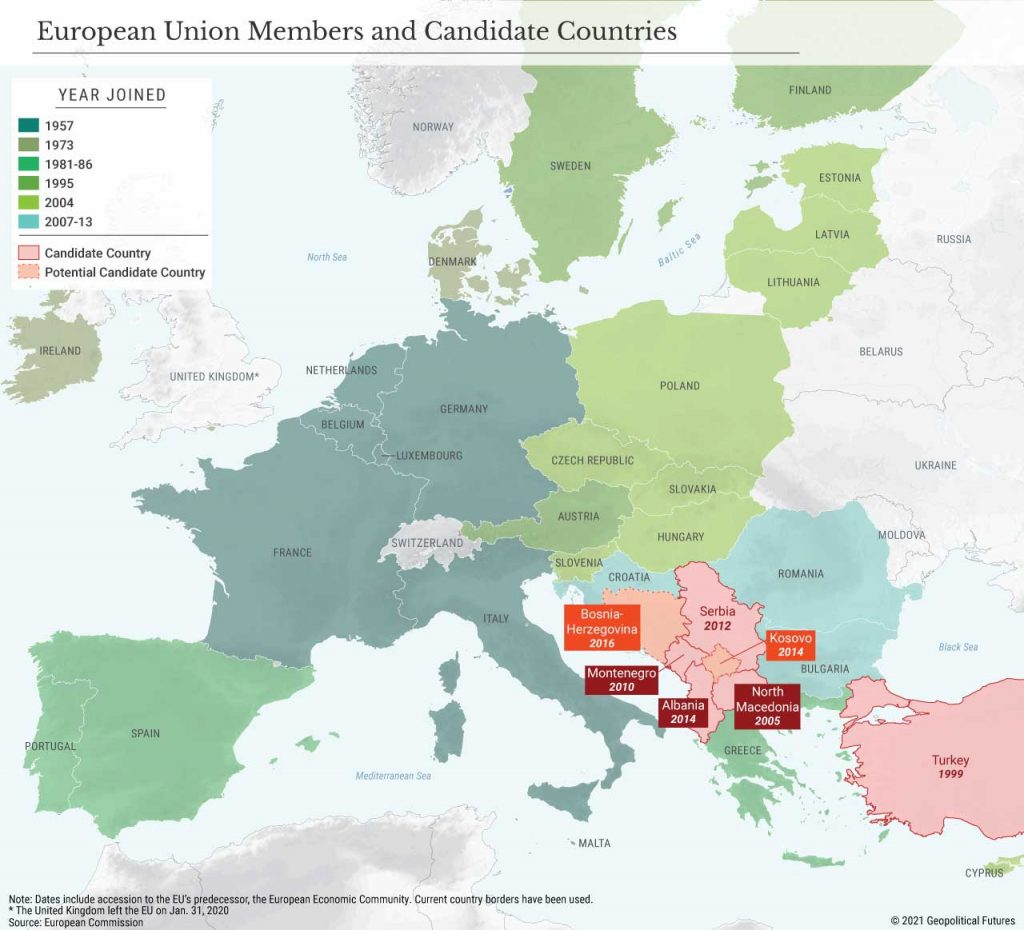The Balkans, also known as the Balkan Peninsula, is a geographic area in Southeast Europe with various geographical and historical definitions.The region takes its name from the Balkan Mountains that stretch throughout the whole of Bulgaria. The Balkan Peninsula is bordered by the Adriatic Sea in the northwest, the Ionian Sea in the southwest, the Aegean Sea in the south, the Turkish Straits in the east, and the Black Sea in the northeast. The northern border of the peninsula is variously defined. The highest point of the Balkans is Mount Musala, 2,925 metres (9,596 ft), in the Rila mountain range, Bulgaria.
Focus Report: The Western Balkans
In July, the leaders of Serbia, North Macedonia and Albania announced a new cooperation initiative for the region. Officially named the Open Balkans project, and unofficially dubbed a mini-Schengen (named for the European Union’s much larger borderless travel area), it aims to lift restrictions to travel and trade between the three countries by 2023. The economic benefits will depend on how the project is implemented, but they’ll be less important than its symbolic value. For most in the Western Balkans – that is, Serbia, Albania, North Macedonia, Kosovo, Bosnia-Herzegovina and Montenegro – it’s the first serious political response to the European Union stalling accession talks, especially since the COVID-19 pandemic began over a year ago.
The Western Balkans
The Western Balkans are comprised of the countries of Former Yugoslavia Slovenia, Croatia, Serbia, Albania, North Macedonia, Kosovo, Bosnia-Herzegovina and Montenegro. Of them, Slovenia and Croatia are both NATO and EU member states. Of the rest some are NATO members – Albania, North Macedonia and Montenegro while none are EU members, even if they have all manifested their will to join the EU. They share the belief that joining the EU will help solve their socio-economic problems. However, having distinct historical and cultural background has created the reality of distinct economic patterns and perceptions. Each country in the region has its own imperatives, sometimes competing with their neighbor, while all are seeking to balance off the influence external powers exert over their fate.
While seeking to become EU members, each country needs to implement reforms in trying to solve its own socio-economic problems and make progress towards EU integration. In their effort, the EU is supposed to help. But with the EU having its own problems, a certain enlargement fatigue has set in which makes for the countries in Western Balkans to be their own help.
To understand the political significance of the Open Balkans initiative, we first must understand the EU’s policy for the region. In 2020, the European Commission announced a “revised enlargement methodology,” which was supposed to increase transparency in the negotiation process for candidate countries while also boosting monitoring of their readiness to join the bloc at various steps in the process – which would allow member states to make a more informed decision about whether the candidates should be accepted. Previously, national leaders of member states voted on accession only after the European Commission established, on its own, that all conditions for membership had been met by the candidate country. Even if the intension was different, the new enlargement process, not only confirmed that enlargement fatigue has truly set in but also forced the Western Balkans to reconsider their positions on membership.
In Albania, public approval rates for the EU have dropped steadily over the past five years, even though they’re still above 70 percent. The need to focus on reconstruction is not just an opportunity for the country to maintain stability; it’s also the reason that public support for the national government has increased.
Trust in Business and Employment Status
Trust in Government
Bosnia’s economic growth has also slowed down during the pandemic, leading to an increase in unemployment. The effects on the labor market have highlighted the need to address structural rigidities restraining growth in private sector jobs.
Trust in Business and Employment Status
Trust in Government
Top paragraph/text. Lorem ipsum dolor sit amet, consectetur adipiscing elit. Curabitur viverra elit felis, id congue ipsum facilisis eu. Morbi tristique neque at pharetra dignissim. Aliquam ac metus eu purus volutpat venenatis. Vestibulum eu ipsum vitae massa tincidunt tincidunt quis eu tellus. In at varius odio.
Trust in Business and Employment Status
Trust in Government
Bottom paragraph/text under charts. If/when we can find it add a couple more charts. Lorem ipsum dolor sit amet, consectetur adipiscing elit. Curabitur viverra elit felis, id congue ipsum facilisis eu. Morbi tristique neque at pharetra dignissim. Aliquam ac metus eu purus volutpat venenatis. Vestibulum eu ipsum vitae massa tincidunt tincidunt quis eu tellus. In at varius odio.
Midway talking points, discussion general region
Trust in Business and Employment Status
Trust in Government
Trust in Business and Employment Status
Trust in Government
North Macedonia
Trust in Business and Employment Status
Trust in Government
Trust in Business and Employment Status
Trust in Government
Conclusion
Lorem ipsum dolor sit amet, consectetur adipiscing elit. In efficitur eu nulla at porttitor. Fusce vitae velit mauris. Fusce ornare nulla nunc. Pellentesque interdum ipsum augue, ac pretium lectus lacinia vitae. Vestibulum fermentum varius consequat. Sed nisi lorem, ultricies id ornare sed, hendrerit ac enim. Cras ac malesuada neque. Aliquam faucibus velit odio, lacinia vestibulum tortor efficitur ac. Maecenas facilisis erat non arcu pulvinar lacinia. Integer faucibus rutrum tortor, quis convallis nulla porta ac. Nulla eu magna non tortor elementum rhoncus. Maecenas et feugiat odio, nec cursus ex. Sed magna ex, tincidunt id luctus id, porttitor et leo. Proin eget viverra ex. Suspendisse non ultrices mi, quis tincidunt nibh. Nullam vehicula porta fringilla.
Suspendisse sed tempor leo. Donec sed mi dapibus, bibendum purus nec, laoreet velit. Aliquam eu ligula mollis dolor commodo ornare. Donec vestibulum vehicula nibh id feugiat. Sed sit amet scelerisque nibh. Sed suscipit leo tincidunt elit rhoncus aliquet. Nam rutrum elementum massa vel tempor. Phasellus quis urna non nunc porttitor lobortis quis ut odio.




 Special Collection – The Middle East
Special Collection – The Middle East